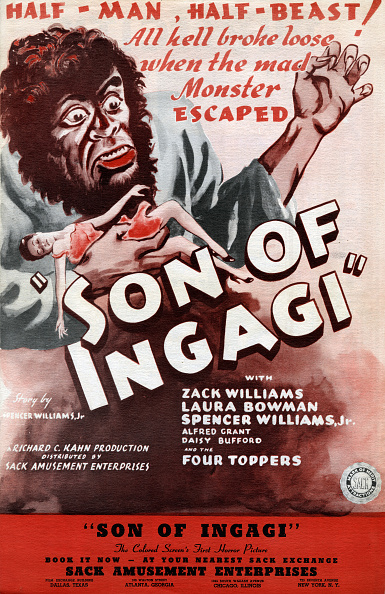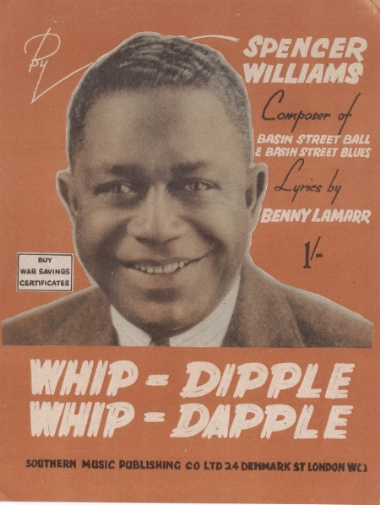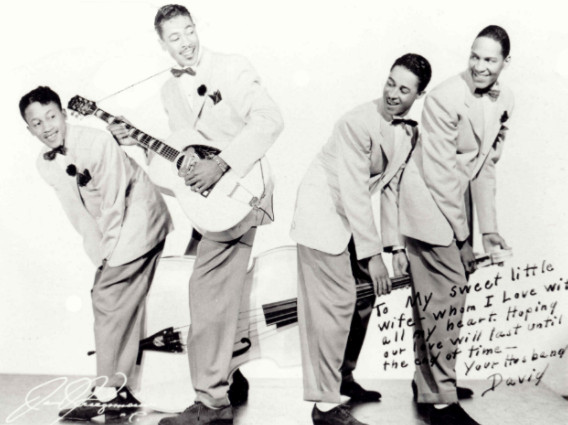
From the 1920's through to the late 1950's there was a thriving black film making business in the U.S.A. serving black audiences through a network of black owned movie theatres in black neighbourhoods in all major and midsized cities throughout most of America, including the South. The movies made for these audiences ran the gamut from serious minded social dramas and religious themed works (often made by pioneering black film-maker Oscar Michaux such as "God's Step Children") to comedies to musicals (by Cab Calloway and Louis Jordan) film-noirs (like "Murder In Harlem" and "Lying Lips" both by Michaux, or "Murder On Lennox Ave") and even westerns such as the popular singing cowboy films made by Herb Jefferies, AKA The Black Gene Autry. But the question remains, did black people make silly Grade-B monster movies? Is there a black equivalent to "Plan 9 From Outer Space", "Robot Monster", "The Creeping Terror" or "Teenagers From Space"? Well yes there was actually. Thanks for asking.
Here we have Exhibit A; "Son Of Ingagi". The oldest surviving black horror movie.
Made in 1940 and often described as the first black monster movie "Son Of Ingagi" was in theroy a sequel to "Ingagi" a notorious film made in 1930 which was supposedly a documentary of a jungle expedition to the Congo which discovered a giant apeman (the Ingagi of the title), a tribe of hostile pygmies, witchdoctors and giant tortoises. It later turned out that the footage had all been shot in America and was all faked. The very name Ingagi which was supposedly an African name for "Giant Apeman" was also made up. The film was a money maker though so finally noted black film-maker Spencer Williams wrote and appeared in this knock-off sequel. In between there were at least two other black horror movies made including a zombie movie called "Voodoo Drums" which is apparently now lost and another film called "The Devil's Daughter" which is also not available. So while "Son Of Ingagi" may not be the first black horror film it is the oldest such film surviving.
"SON OF INGAGI"
CAST:
Ingagi ~ Zach Williams
Dr. Helen Jackson ~ Laura Bowman
Robert Lindsey ~ Alfred Grant
Elenore Lindsey ~ Daisy Bufford
Zeno Jackson ~ Arthur Ray
Detective Nelson ~ Spencer Williams
Mr Bradshaw ~ Earl Morris
Police Chief ~ Jessie Graves
And Featuring The Toppers (Steve Gibson, Jimmy Springs, David Patillo and Richard Davis) as themselves
Directed by Richard Kahn
Written by Spencer Williams
Filmed in 1940
PLOT SYNOPSIS (SPOILER ALERT);
Robert and Elenore Lindsey exit from a church on their way to a honeymoon after being married. They meet Mr. Bradshaw, their lawyer. As they depart Dr. Jackson, an elderly woman with a sour face walks up and asks him to come by her place later as she wishes to change her will. As she leaves Detective Nelson, a large fat man, walks up and greets Bradshaw, Dr. Jackson insults him and leaves.
Before the newly weds depart on their honeymoon they return home where the wedding guests arrive to throw them a surprise party. Entertainment is provided by The Toppers, a Doo-Wop group. Dr. Jackson arrives and spies on the party from outside but leaves without knocking.
Suddenly an explosion occurs outside which turns out to be at the foundry where Robert works, he and the other guests rush out to investigate leaving Elenore behind. Dr. Jackson enters to talk to Elenore. It is revealed that Elenore is an orphan who was raised in an orphanage which was secretly financed by Jackson who is a former African Missionary who had been in love with Elenore's father. Jackson gives Elenore a wedding gift of a valuable necklace and leaves.
Arriving to her mansion Jackson discovers and intruder who turns out to be her brother Zeno Jackson, a gambler. Zeno has been blackmailing Dr. Jackson over gold she smuggled into the country from Africa during her missionary work. As he demands more money Dr. Jackson bangs a small gong which she says she got during her missionary work. The gong summons N'Gila, a tall savage creature with long hair, an ape-like face and dirty clothes. He is simple-minded and speaks in grunts. He follows orders of Dr Jackson who uses him to threaten Zeno who flees.
Robert Lindsey has returned home, he reports that the foundry where he works has been destroyed. That night an envelope containing a cryptic message is slid under their door.
Dr. Jackson is at home in her secret laboratory in her basement. She is working on inventing a miracle drug. N'Gila lives in the basement in a small cell. He has cut his hand while scuffling with Zeno and Jackson bandages his hand before returning to her potions. N'Gila drinks one and goes berserk killing Jackson. N'Gila flees.
Robert and Elenore arrive to Jackson's house, they plan to ask here about the cryptic message they received. They find Jackson dead and call the police. They do not find N'Gila's basement cell. Detective Nelson discovers Jackson's will in which she left her fortune and house to Ellenor. Nelson arrests Robert for Jackson's murder. A series of newspaper headlines then inform us that Robert was acquitted.
Robert returns to Elenore and their new home which is Jackson's old mansion. Bradsahaw meets with Elenore, he is now their lawyer and he tries to convince the Lindsey's to sell the Jackson mansion. When Elenore leaves him alone in the study he begins to search through the desk when N'Gila shows up and kills him. Robert arrives home and discovers the body and call the police. Another series of headlines announce Bradshaw's death. Detective Nelson arrives again and tells the Police Chief that he suspects suicide. The Chief ridicules him and orders him to stay at the house and investigate. That night Zeno breaks in to search for Jackson's stache of gold. Robert and Elenore are awoken by the noise. Robert confronts Zeno and they fight until Elenore attempts to hit Zeno with a vase but knocks out Robert instead. Zeno escapes. Detective Nelson has been assigned by the Police Chief to guard the house and is sleeping downstairs and he is woken by the scuffle and runs in. He searches for Zeno but doesn't find him. Deciding Elenore and Robert are lying, Nelson gives up and decides to make himself a sandwich. N'Gila has been spying on Nelson and steals Nelson's food while his back is turned. Nelson is puzzled.
Zeno has discovered the cryptic note left for Elenore. He has also stumbled on to Jackson's secret basement lab where N'Gila lives and begins to ransack it when N'Gila returns. Zeno shoots N'Gila in the head but N'Gila doesn't die. Zeno tries to flee but N'Gila kills him. Elenore is woken by the shots but when she tries to wake Robert he doesn't believe her.
Neslon is also sound asleep on a couch downstairs. N'Gila drags Zeno's body upstairs and dumps him at Zeno's feet. Then N'Gila goes upstairs and finds Elenore who passes out. He carries her to his basement cell. Nelson wakes and finds Zeno's body. He panics and screams waking Robert who discovers Elenore missing. He runs to Nelson for assistance, Nelson calls the Police Chief but does little else.
Meanwhile N'Gila is trying to revive Elenore using Jackson's potions. Unfortunately he knocks over a lantern and starts a fire. Ellenor awakes and starts screaming. Robert and Nelson hear her screams and discover the secret door to the basement, they break it down. Robert rescues Elenore while Nelson tries to arrest N'Gila. They scuffle and Robert pushes N'Gila into his cell and locks it as the flames rise. The mansion burns down as the police and fire trucks arrive. The Police Chief and the Lindsey's believe Nelson has died in the flames. The Chief praises Nelson until Nelson emerges from the bushes where he has been hiding after escaping from the fire. He reports that N'Gila is dead and that he has found Jackson's treasure which he gives to the Lindsey's. They will live happily ever after.
~~~~~~~~~~~~~~~~~~~~~~~~~~~~~~~~~~~~~~~~~~~~~~~~~~~`

By any rational standpoint this is a silly low-budget B-Movie quickie no better than those made by the likes of Ed Wood, Phil Tucker or Arch Hall Sr. The direction and acting is bland and non-nondescript. The dialogue is wooden and the story is flimsy and full of obvious loopholes and just plain sloppiness which suggests a too quick shooting schedule. For example the series of spinning newspaper headlines announcing Bradshaw's death appear before Detective Nelson even arrives to investigate. And while we are informed through the ubiquitous spinning newspapers that Robert was acquitted of Jackson's death, we are not told why or anything about his trial. Another oddity is that while we are told several times that Jackson was a missionary in Africa at one point she says that she brought N'Gila (clearly a South African name) back from Singapore!
The character of Detective Nelson is a stock comic relief character of the era, but even by the standards of the time he is exceptionally dense. His raiding the ice-box and sleeping on the job are one thing but deciding that Bradshaw's death was a suicide after noting that he died of massive head injuries, broken ribs and crushed larynx is too stupid for words. On the other hand it is the funniest line in the film.
At the same time while the film is not much better than those made by Ed Wood, Arch Hall or Phil Tucker ("Robot Monster") it is certainly no worse, and it's certainly better than the likes of "The Creeping Terror" or Dwain Esper's "Maniac". The acting and direction while mediocre were not incompetent. The cast had some experience in other all-black productions with Spencer Williams (Detective Nelson) having a particularly noteworthy career. Best known for playing in the Amos & Andy series, he also was a prolific director and screenwriter (he wrote the script for this film) making several films in various genres from religious films to film noirs, he was also a songwriter. Being a big man meant that as an actor he played both comic relief and villain roles successfully for many years. As for the rest of the cast Zach Williams who plays N'Gina had appeared in the original version of "The Four Feathers" and had a bit part in "Gone With The Wind", Daisy Buford (Elenore) also had a bit part in "Gone With The Wind" as well. Other cast members appeared in several other Spencer Williams films, in fact it is probably safe to say that Williams rather than Kahn was the brains behind this film.

The direction by white director Richard Kahn is strictly rote but it does have a few decent sequences. The best comes when Jackson is killed and she knocks over an inkwell which falls on the rug causing an ink stain which resembles flowing blood. The outside shots of the burning of Jackson Manor are realistically done as well.
Some of the themes in the movie are clearly taken from other well known horror movies of the era which add a touch of depth to the otherwise silly story. N'Gila is not just a monster but a misunderstood loner like Frankenstein who doesn't always mean to kill. He is being used by Jackson who he kills almost by accident. He is attacked by Zeno and accidentally provoked by Bradshaw. He does not mean to hurt Elenore and even tries to revive her. His death in a fire is another echo of the deaths of Frankenstein, the Phantom Of The Opera, Hunchback Of Notre Dame, Mighty Joe Young (a King Kong sequel) or the Bela Lugosi and Boris Karloff characters in "The Black Cat". The make-up job for N'Gila is perfunctory but it is still better than the classic stupidity of "Robot Monster", "The Creeping Terror" or "Egaah". So that's something.
There is a notable difference between Ingagi and some of the other black films of the time such as those of Oscar Michaux. That is the lack of preaching any social or political agenda. Even when Michaux made genre films like his film noir "Murder In Harlem" he insisted on stopping the action for several minutes at a time to have his characters deliver speeches on black empowerment. This tends to drag out the film and damage it's momentum, especially for modern audiences. Kahn and Williams simply get on with the story as efficiently as possible. This does not mean their is no black empowerment message however. There are no whites in the film at all so all the authority figures (doctor, detective, lawyer) are black. The character of Robert is described as working at a "foundry" but he is always dressed in a respectable suit and tie which suggests he is an office worker or middle management rather than a blue collar worker or custodian. Dr. Jackson is both a rich doctor who lives in a mansion as well as a brilliant scientist. Even the Police Chief is black which is a little unlikely for the era but this is all simply presented matter-of-factly and then the movie rolls merrily on.
Although made in 1940 it is a little behind the times in some ways even for then but if a bit more time and care had been taken in making this film it could have been a decent genre picture, as it is it remains an odd curio of the era. Speaking of which the film does stay within the conservative screen values of the day, note that the newly-weds sleep in separate beds on opposite sides of the room.

A note on The Toppers who provide the musical numbers for the wedding party. Led by Steve Gibson they were a fairly well known early Doo-Wop group who recorded a number of singles well into the rock & roll era both as The Toppers and as The Red Caps in various line-ups until 1970. Gibson would also sing with The Ink Spots before dying in the 1980's. This appears to be the only footage of them.
THE TOPPERS ~ "I'M A YOUNG MAN";

No comments:
Post a Comment